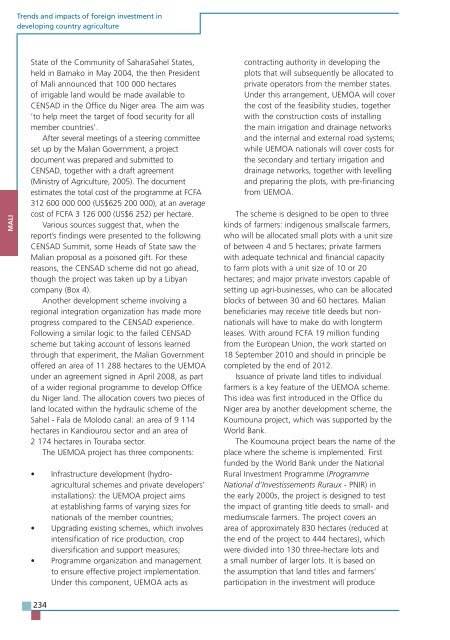TRENDS AND IMPACTS OF FOREIGN INVESTMENT IN DEVELOPING COUNTRY AGRICULTURE
TRENDS AND IMPACTS OF FOREIGN INVESTMENT IN DEVELOPING COUNTRY AGRICULTURE
TRENDS AND IMPACTS OF FOREIGN INVESTMENT IN DEVELOPING COUNTRY AGRICULTURE
Create successful ePaper yourself
Turn your PDF publications into a flip-book with our unique Google optimized e-Paper software.
MALI<br />
Trends and impacts of foreign investment in<br />
developing country agriculture<br />
State of the Community of SaharaSahel States,<br />
held in Bamako in May 2004, the then President<br />
of Mali announced that 100 000 hectares<br />
of irrigable land would be made available to<br />
CENSAD in the Office du Niger area. The aim was<br />
‘to help meet the target of food security for all<br />
member countries’.<br />
After several meetings of a steering committee<br />
set up by the Malian Government, a project<br />
document was prepared and submitted to<br />
CENSAD, together with a draft agreement<br />
(Ministry of Agriculture, 2005). The document<br />
estimates the total cost of the programme at FCFA<br />
312 600 000 000 (US$625 200 000), at an average<br />
cost of FCFA 3 126 000 (US$6 252) per hectare.<br />
Various sources suggest that, when the<br />
report’s findings were presented to the following<br />
CENSAD Summit, some Heads of State saw the<br />
Malian proposal as a poisoned gift. For these<br />
reasons, the CENSAD scheme did not go ahead,<br />
though the project was taken up by a Libyan<br />
company (Box 4).<br />
Another development scheme involving a<br />
regional integration organization has made more<br />
progress compared to the CENSAD experience.<br />
Following a similar logic to the failed CENSAD<br />
scheme but taking account of lessons learned<br />
through that experiment, the Malian Government<br />
offered an area of 11 288 hectares to the UEMOA<br />
under an agreement signed in April 2008, as part<br />
of a wider regional programme to develop Office<br />
du Niger land. The allocation covers two pieces of<br />
land located within the hydraulic scheme of the<br />
Sahel - Fala de Molodo canal: an area of 9 114<br />
hectares in Kandiourou sector and an area of<br />
2 174 hectares in Touraba sector.<br />
The UEMOA project has three components:<br />
Infrastructure development (hydroagricultural<br />
schemes and private developers’<br />
installations): the UEMOA project aims<br />
at establishing farms of varying sizes for<br />
nationals of the member countries;<br />
Upgrading existing schemes, which involves<br />
intensification of rice production, crop<br />
diversification and support measures;<br />
Programme organization and management<br />
to ensure effective project implementation.<br />
Under this component, UEMOA acts as<br />
234<br />
contracting authority in developing the<br />
plots that will subsequently be allocated to<br />
private operators from the member states.<br />
Under this arrangement, UEMOA will cover<br />
the cost of the feasibility studies, together<br />
with the construction costs of installing<br />
the main irrigation and drainage networks<br />
and the internal and external road systems;<br />
while UEMOA nationals will cover costs for<br />
the secondary and tertiary irrigation and<br />
drainage networks, together with levelling<br />
and preparing the plots, with pre-financing<br />
from UEMOA.<br />
The scheme is designed to be open to three<br />
kinds of farmers: indigenous smallscale farmers,<br />
who will be allocated small plots with a unit size<br />
of between 4 and 5 hectares; private farmers<br />
with adequate technical and financial capacity<br />
to farm plots with a unit size of 10 or 20<br />
hectares; and major private investors capable of<br />
setting up agri-businesses, who can be allocated<br />
blocks of between 30 and 60 hectares. Malian<br />
beneficiaries may receive title deeds but nonnationals<br />
will have to make do with longterm<br />
leases. With around FCFA 19 million funding<br />
from the European Union, the work started on<br />
18 September 2010 and should in principle be<br />
completed by the end of 2012.<br />
Issuance of private land titles to individual<br />
farmers is a key feature of the UEMOA scheme.<br />
This idea was first introduced in the Office du<br />
Niger area by another development scheme, the<br />
Koumouna project, which was supported by the<br />
World Bank.<br />
The Koumouna project bears the name of the<br />
place where the scheme is implemented. First<br />
funded by the World Bank under the National<br />
Rural Investment Programme (Programme<br />
National d’Investissements Ruraux - PNIR) in<br />
the early 2000s, the project is designed to test<br />
the impact of granting title deeds to small- and<br />
mediumscale farmers. The project covers an<br />
area of approximately 830 hectares (reduced at<br />
the end of the project to 444 hectares), which<br />
were divided into 130 three-hectare lots and<br />
a small number of larger lots. It is based on<br />
the assumption that land titles and farmers’<br />
participation in the investment will produce


